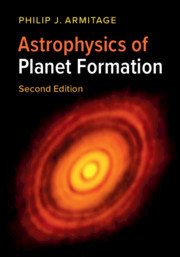Description
Astrophysics of Planet Formation (2nd Ed., New edition)
Author: Armitage Philip J.
A self-contained graduate-level introduction to the physical processes that shape planetary systems, covering all stages of planet formation.
Language: English
Subject for Astrophysics of Planet Formation:
Approximative price 86.49 €
In Print (Delivery period: 14 days).
Add to cart
Publication date: 01-2020
342 p. · 17.9x25.3 cm · Hardback
342 p. · 17.9x25.3 cm · Hardback
Description
/li>Contents
/li>Biography
/li>
Concise and self-contained, this textbook gives a graduate-level introduction to the physical processes that shape planetary systems, covering all stages of planet formation. Writing for readers with undergraduate backgrounds in physics, astronomy, and planetary science, Armitage begins with a description of the structure and evolution of protoplanetary disks, moves on to the formation of planetesimals, rocky, and giant planets, and concludes by describing the gravitational and gas dynamical evolution of planetary systems. He provides a self-contained account of the modern theory of planet formation and, for more advanced readers, carefully selected references to the research literature, noting areas where research is ongoing. The second edition has been thoroughly revised to include observational results from NASA's Kepler mission, ALMA observations and the JUNO mission to Jupiter, new theoretical ideas including pebble accretion, and an up-to-date understanding in areas such as disk evolution and planet migration.
Preface; 1. Observations of planetary systems; 2. Protoplanetary disk structure; 3. Protoplanetary disk evolution; 4. Planetesimal formation; 5. Terrestrial planet formation; 6. Giant planet formation; 7. Early evolution of planetary systems; Appendix 1: physical and astronomical constants; Appendix 2: N-body methods; References; Index.
Philip J. Armitage is a professor in the Department of Physics and Astronomy at Stony Brook University, State University of New York and he leads the planet formation group at New York's Center for Computational Astrophysics. He teaches classes on planet formation to advanced undergraduate and graduate students, and has lectured on the topic at summer schools worldwide.
© 2024 LAVOISIER S.A.S.




